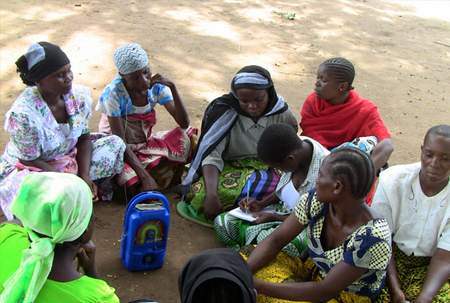-
About
- Our Work
- Get Involved
- Stay Updated
"Agricultural development depends on innovation. Innovation is a major source of improved productivity, competitiveness, and economic growth throughout advanced and emerging economies, and plays an important role in creating jobs, generating income, alleviating poverty, and driving social development. If farmers, agribusinesses, and even nations are to cope, compete, and thrive in the midst of changes in agriculture and economy, they must innovate continuously".
- The World Bank on Agriculture Innovation Systems (AIS)
 Agriculture Innovation Systems (AIS) aim to improve farmers productivity. Besides classical approaches like training and regular/systematic visits, there are several others like Farmers Field Schools (FFS), market access or market oriented approaches
Agriculture Innovation Systems (AIS) aim to improve farmers productivity. Besides classical approaches like training and regular/systematic visits, there are several others like Farmers Field Schools (FFS), market access or market oriented approaches
These new approaches also use several tools. Studies have proven that, using Information and Communication Technologies (ICTs) as rural development tools can lead to good results: How can we uses mobile phones, internet, community radio and others in AIS? Here are my experiences in Cameroon.
The potential of mobile phones in agricultural extension
Mobile phone connectivity can help in agriculture and rural development. In my experience, farmers must first consider mobile phones as work tool and not as a luxury. They should be familiar with their phone when using it.
In my field, mobile phones are used to inform farmers about market demand and supply, about market opportunities. In Cameroon, for example, government actions in rural areas are mostly in support of the agricultural sector. Often NGOs work with the government to help them achieve certain national goals. The Cameroon NGO Association Camerounaise pour la Dépense des Intérêts Collectifs (ACDIC) has a good experience with these services.
In Cameroon, Short Message Services (SMSes) are used to disseminate new agricultural policies to farmers. When farmers plan their cropping season or plan new projects, they can submit it to NGOs connected to donors, or to communal decision makers. This allows some farmers to get gets financial and/or technical support. ACDIC also used SMS services to inform farmers about the planting date or seeding due to scarcity of rain.
SMSes are also used to inform farmers about specific crops and availability of new seeds. This year about 97% of small scale farmers would have missed the availability of seeds for a new maize variety. But due to the fact that there were informed by SMS before the planting season, they were able to access these seeds.
Community Radio in farmers education and trainings
Throughout Cameroon, community radio is other ICT tool used to reach the farmers. We have more than 200 community (or local) radio stations operating in rural areas. Each radio has a specific day on which they focus on agriculture. Those broadcasts educate, train and inform farmers on diverse topics concerning their daily activities. This type of service has been successful in Brazil and India. A challenge we faced in Cameroon, was that all local radio programs had to use the local languages, so programs were made and tailored on basis of their target area.
The success on the use of community radios by NGOs lead the state to get involved. So today the national Telecommunication Agency (CAMTEL) has multiplied its coverage around the country in order to reach most rural areas, both on telephone, radio and TV.
Youth and ICTs
ICTs have an important role in agriculture development, food security and rural development. ICTs will allow farmers to cope with the globalization and the border-less information age and take advantage of E-trade, E-commerce, E-learning, E-education .
To achieve this, youth has to be included within the process of agricultural innovation, as they are crucial for economic growth, social security, political stability, Youth represents more than 60% of the population active in manual work in all sectors, and most notably in agriculture. They will lead the world tomorrow and ICTs are key to their success in the world in general, and in agriculture specifically.
Blopost by Nestor Ngouambe and orignally posted in the FARA-AASW Blog. Picture courtesy of Farmer Radio International.
Tags:Africa Aquaculture CAADP Fish Fisheries fishnode Integrated fish farming systems IWMI Malawi NEPAD Research Sub-Saharan Africa WorldFish aasw Agriculture Agriculture innovation systems Cameroon Community radio E-Commerce E-education E-learning FARA Farmer Field School Farmers' education ICT mobile phones Nigeria Rural development TV youthAbout the author
Related Posts
Comments
No comments made yet. Be the first to submit a commentBy accepting you will be accessing a service provided by a third-party external to https://www.ypard.net/
Get in touch
Email: [email protected]
YPARD Global Coordination UnitHosted by AGRIDEA and the Czech University of Life Sciences Prague
Lausanne, Switzerland and Prague, Czech Republic - Our Work

